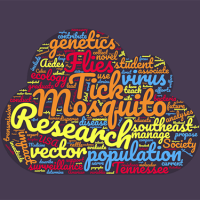I joined the Entomology and Plant Pathology Department in March 2012 as a Medical and Veterinary Entomologist. I have a broad background in medical and veterinary entomology with specific training in vector control, vector and pathogen surveillance, and vector ecology and genetics. My appointment is 90% research and 10% teaching; so I teach and study what I love: vector-biology and vector-borne diseases. I run my research program as a team, and the team’s mission: to improve human and animal health and welfare by minimizing the negative impacts of arthropods. Our research integrates vector management and control, describes vector life histories, delineates risk factors for pathogen and vectors, and characterizes vector populations using genetics (microbial, population, and landscape). Outcomes from the research program are the clarification of the role(s) of each arthropod in pathogen transmission and determination of underlining factors (from molecule to ecosystem) that contribute to the success of vectors.
I value and respect my diverse team members, and each has contributed significantly to the science and the program. The diversity of disciplines (e.g., entomology, animal science, biochemistry, pre-professional), experiences (e.g., high school, undergraduate, graduate, medical, veterinary medicine, etc.), and backgrounds (e.g., STEM-underrepresented groups) have helped make the research program successful. I also actively recruit people who want to work hard and make a positive impact on society. I am committed to strengthening diversity in science, and I am extremely proud of the students that contribute to the program.












